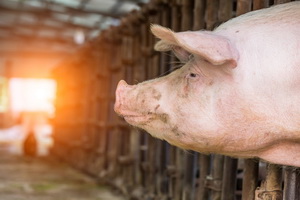
Transgenic Pigs that Digest Grains Better can Reduce Pork Industry's Carbon Footprint
May 30, 2018| |
 A new research published in eLife presents transgenic pigs with the ability to digest more nutrients, which could possibly help reduce the pork industry's environmental impact.
A new research published in eLife presents transgenic pigs with the ability to digest more nutrients, which could possibly help reduce the pork industry's environmental impact.
A large amount of feed for pigs is wasted as they are unable to digest two of its key nutrients that cause environmental damage: nitrogen and phosphorus. Excessive amounts of these nutrients are subsequently released through the animals' manure into the environment, where they can pollute both air and water. Pigs release harmful amounts of these nutrients as they lack the microbial enzymes that break down phytate - the main source of nitrogen and phosphorus - and types of fiber called non-starch polysaccharides. The enzymes are β-glucanase, xylanase, and phytase.
The group led by Xianwei Zhang, postdoctoral researcher at the South China Agricultural University delivered the three enzymes into the genome of pigs. The enzymes were optimized to adapt to the pigs' digestive system. They were expressed specifically in the pigs' salivary gland, allowing the digestion of phytate and non-starch polysaccharides to begin in the mouth. The feeding trials showed that the pigs were able to digest these and other key nutrients, lowering their emissions as a result. The team also found that the animals' increased nutrient uptake led to a faster growth rate, and that no negative side effected were reported.
For more details, read the paper in eLife.
| |
Biotech Updates is a weekly newsletter of ISAAA, a not-for-profit organization. It is distributed for free to over 22,000 subscribers worldwide to inform them about the key developments in biosciences, especially in biotechnology. Your support will help us in our mission to feed the world with knowledge. You can help by donating as little as $10.
-
See more articles:
-
News from Around the World
- FAO: Incorporating Biodiversity as a Priority in Agri Can Yield Multiple Benefits
- African Countries Need to Push Climate Smart Agriculture
- Researchers Engineer Cell-Like Structure for Photosynthesis
- Golden Rice Gets Approval from US FDA
- Special Screening of Documentary on GMOs held for Legislators in the Philippines
- EFSA Publishes Scientific Opinion on GM Maize 4114
-
Research Highlights
- Gene from Taro Confers Aphid Resistance in Indian Mustard
- Endogenous Proteins Expression in Maize Tested in a Multi-Location Fields in India
- Candidate Gene for Drought Tolerance Found in Wheat
-
Beyond Crop Biotech
- New Arabica Coffee Genome Sequence Made Available
- Transgenic Pigs that Digest Grains Better can Reduce Pork Industry's Carbon Footprint
-
Announcements
- Conversations on Climate Change
- Workshop on Marker Assisted Breeding in Oilseed Mustard
-
Resources
- Video: Uganda's GMO Potato Story
-
Plant
- Chinese Researchers Develop Herbicide Tolerant Watermelon
- Scientists Find Resistance Gene Against Rice Blast
- SDG8 Genes Involved in Floral Transition in Rapeseed
- CRISPR Editing Tested on Carotenoid Synthesis Genes in Tomato
-
Read the latest: - Biotech Updates (February 18, 2026)
- Gene Editing Supplement (January 28, 2026)
- Gene Drive Supplement (February 22, 2023)
-
Subscribe to BU: - Share
- Tweet
